Are you worried that you’ve left it too late to potty train your child?
If you have a child who is age three and over but showing no signs of being willing to ditch the nappies, you’ve come to the right place.
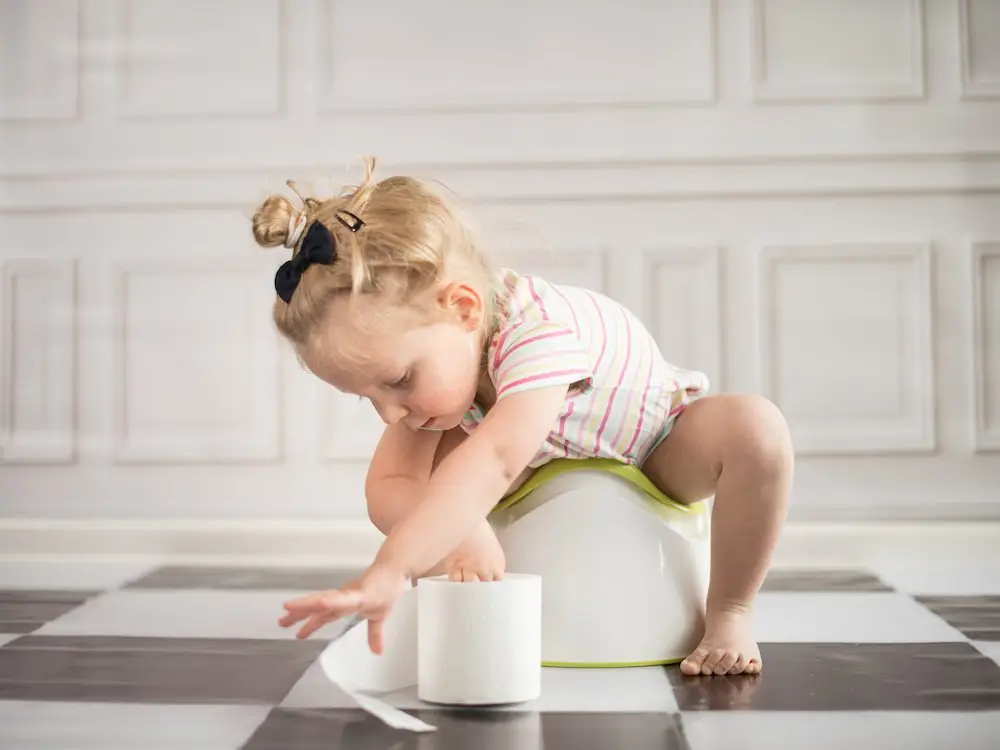
Most people potty train from around 18 months. In fact you hear of some parents who decide to potty train even earlier, at age one or even younger.
So, if you have a child who has turned three and is showing no signs of being ready to ditch nappies, it can make you worry that you’ve missed the boat with toilet training.
Let me say right away – do not panic!
Not only are you definitely not alone – it happened to me and dozens of parents who have commented on my YouTube video about this very subject – but I can tell you there’s light at the end of the tunnel.
I have a child who at one stage I feared would never get it – but here we are over three years later and zero toiletting issues. So it’s going to be OK, but maybe this process will take a little longer. And that is absolutely fine!
Potty training after age three
My first child was potty trained at around the age of two. We had two or three false starts before she finally cracked it at 2.5years.
With the knowledge of our false starts where I had spent a few days trying to force potty training when my child was not ready, I decided I would definitely not be forcing my youngest child into it.
We didn’t get started until she was close to three, but then when we did we had a ton of false starts. She seemed ready but then just wouldn’t use the toilet. The second a nappy went back on her, she used it.
And there were many moments where I questioned if I was going about this all wrong.
The number one potty training tip I learned
Toilet training can be such a stressful business at the best of times, but forcing it before your child is actually ready just sets you up for weeks of battles and mopping up wee from the floor.
Do not force it if they are not ready. Take a break and step back – try again in a week or two.
We cracked toilet training at just under 3.5years. And actually I have to say there were quite a few benefits to having delayed potty training a while.
One is that we didn’t have so many accidents and another is that my three-year-old was excellent at communicating when she needed to use the toilet.
She was also already big enough to climb on and off the toilet herself, so she didn’t needed a little potty that I’ve then had to clean.
So I thought this was a good time to explain why it’s totally fine to not have potty trained your child before age three, plus some tips on how to cope with delayed potty training.
Is it normal to not be potty trained age 3?
First of all, just because your child is not potty trained at age three, it does not mean anything is wrong with them!
Some people link speech delay with late potty training. While this is the case that some parents of toddlers with speech delay do find that potty training is a little trickier, it doesn’t mean the two go hand-in-hand together.
My youngest daughter has been a fantastic talker since she was a baby. She has been chattering away to us since before she could climb onto a chair without help.
So I know that speech delay or developmental problems have absolutely nothing to do with our late potty training. She has always been bright, physically fit, eaten a good diet and been very open to trying new things. She just wasn’t so open to ditching nappies.
Now you could read a ton of different theories as to why your toddler may decide they don’t fancy switching nappies for the toilet.
One theory I have, which could be plausible, is that if you do not change your toddler as frequently then they are used to sitting in a soiled or wet nappy and aren’t motivated to tell you that they are dirty.
But to be honest I think some kids just aren’t that bothered about having a dirty butt.
So whatever the reason your three-year-old still isn’t potty trained, please don’t beat yourself up about it. If everything else about your child is normal, this is just when of those things.
Reasons to delay potty training your toddler
You may have already tried to potty train your child before the age of three.
If you have had a few false starts then you might already have an idea of what the issues are that your child is having.
But here are a few reasons why your child may be late to potty training:
- They have zero interest in sitting on the toilet. If you’re having to carry your child to the toilet kicking and screaming, then they’re probably just not up for using it yet! You don’t want to make potty training scary, because by making it a positive experience it will happen so much quicker.
- They do not tell you when they have done a poo or wee. If your child does not communicate that they have messed in their nappy, then they may struggle to let you know when they need to reach a toilet. They need to connect the sensation of doing a poo or wee, with needing to be on the toilet.
- When you try to potty train, your child repeatedly wets or poos themselves without any communication or effort to use the toilet.
- They don’t even want to discuss the toilet and nappies. My youngest would not even talk about the toilet, whereas my eldest did want to chat about the potty and what she was supposed to do on it.
- You’re not ready. Maybe you are pregnant, or you have a big life event coming up that would be way easier to deal with if your child is still in nappies, such as a holiday. Whatever the reason, it’s important that you are as ready to do this as your child is.
How to potty train your three-year-old
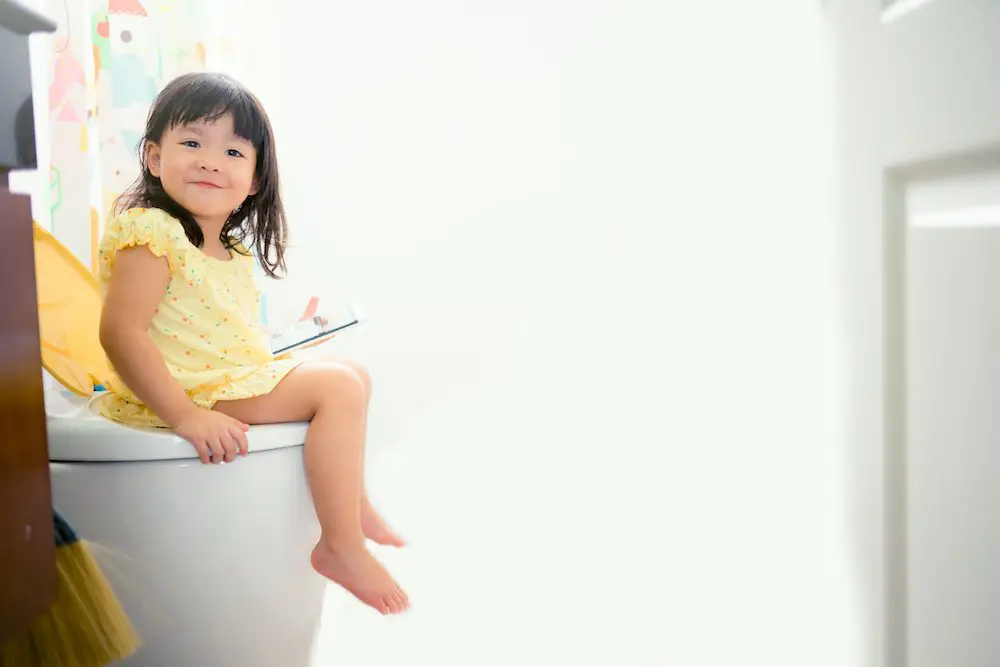
If you are worried your three-year-old still isn’t ready for potty training then check out my post on 5 key signs your child is not ready for toilet training.
It could be however that your child is ready, but they’re just a little stubborn. So if you want to finally crack potty training, try these top hacks for ditching the nappies.
1. Pick your moment carefully
Discuss using the toilet with your child as much as you can before the day you actually get started with potty training.
Let them watch you using the toilet so that they get an idea for how it works, as well as what they should do with wiping and flushing.
Start first thing in the morning, having told your child the day before that you would be not putting them in a nappy the next day. Let your child pick out their pants so that they feel excited about having new clothes, or choose underwear that features their favourite cartoon character.
Try not to suddenly introduce underwear halfway through a day.
Choose a day that is convenient for you when you can stay at home, or close to home, so that you can get your child onto the toilet regularly.
2. Is a potty or the toilet best?
At age three your child can get on and off the toilet themselves much easier.
With a step and a toilet seat, my three-year-old could be completely independent when it came to climbing on and off the toilet. Once she had finally accepted potty training!
However when you have a child who has been resistant to potty training, and is having frequent accidents, it can help to have a toddler potty.
You can place it in the same room where your child is playing, so that they do not have to go far when they need to use the toilet.
Many children who are late to potty training may do so because they just don’t want to take time out of playing to use a toilet when all they have to do is do their business in a nappy.
If you have a convenient potty for them right where they’re playing, they may be more willing to give it a go. You could also try having the TV on when you think they may need a poo and let them watch while on the potty. This helps to convince them to stay on the potty more than 30 seconds!
3. Use Alexa to help
This is a brilliant tip as you will need to get your child onto the potty a lot, especially if they’re unsure about what they actually need to be doing on the toilet or they are stubborn.
If you have an Amazon Alexa then use that, or you can use whatever operating system you have on your phone.
Set Alexa up to give you alerts every 20 minutes saying something like “do you need the toilet?” You could add your child’s name to the prompt which may help get them more engaged in the process.
Aim to get your child onto the toilet every 20 minutes until they do a wee. Then leave it 30 minutes to an hour after they have done one and try again.
You will get a feel for how often your child actually goes in the day. Always try them on the toilet around five minutes after a meal.
4. Be extremely enthusiastic
Once your child does manage a wee or poo in the toilet, be very happy about it!
Clap and praise them, emphasising what it is they have done right. “Well done, you did a wee in the toilet, that’s brilliant good girl.”
If this isn’t quite enough to motivate your child then try a sticker reward chart. When they have earned five stickers for doing five successful trips to the toilet, then they get a prize like sweets or an ice lolly.
Make it a prize you’re happy for them to have a daily basis. And remember to tell them they have to actually produce a wee on the toilet to get a reward, not just sit on it.
5. Accept the accidents
Sometimes there will be accidents. This is true whatever age your child is when you potty train.
Do not shout or get cross about accidents. Instead say “oh dear you didn’t make it to the toilet” and clean up the mess.
Don’t dwell on the mess and instead just remember to try your child on the toilet again soon after.
If your child is having a few accidents a day at the beginning, then get some cheap spare pairs of trousers or shorts and underwear so that you can go through the clothes without doing tons of laundry every day.
You can help to avoid accidents in the car with one of these awesome machine-washable pads! Mine has lasted through two kids!
6. Be prepared for potty training on the go
You could lock yourself up at home permanently until potty training is finally resolved. But where’s the fun in being stuck at home all of the time!
To make potty training on the move easier, you need one of these Potette portable potties – they are absolutely essential potty training gear and mean you have a toilet everywhere you go!
They have been an absolute lifesaver in the potty training of both my children. They’re really compact, and I can actually fit mine in my backpack.
It means that wherever we are, I can have a potty ready for my child to use in less than a minute.
Having one of these has made life so much less stressful when we’ve been out places where there’s no access to a toilet.
We used ours on the side of the, in the middle of the woods, at the park, out shopping. You name it, we probably used our Potette there!
7. Be consistent
Stick to your guns and hold firm.
Potty training is challenging with a stubborn child, but you will definitely get there! Sometimes it can be surprising how it suddenly just clicks one day.
If your child is really upset or just not getting it, then you may need to quit for two weeks. It’s better to be all the in or all the way out when it comes to potty training. Don’t try half a day in nappies then half a day in pants as you’re then giving your child confusing messages.
Give yourself a break, and try again in a couple of weeks.
I hope these tips will help you crack potty training. Remember to take the pressure off yourself and keep your cool.
You may also like: Tips for potty training
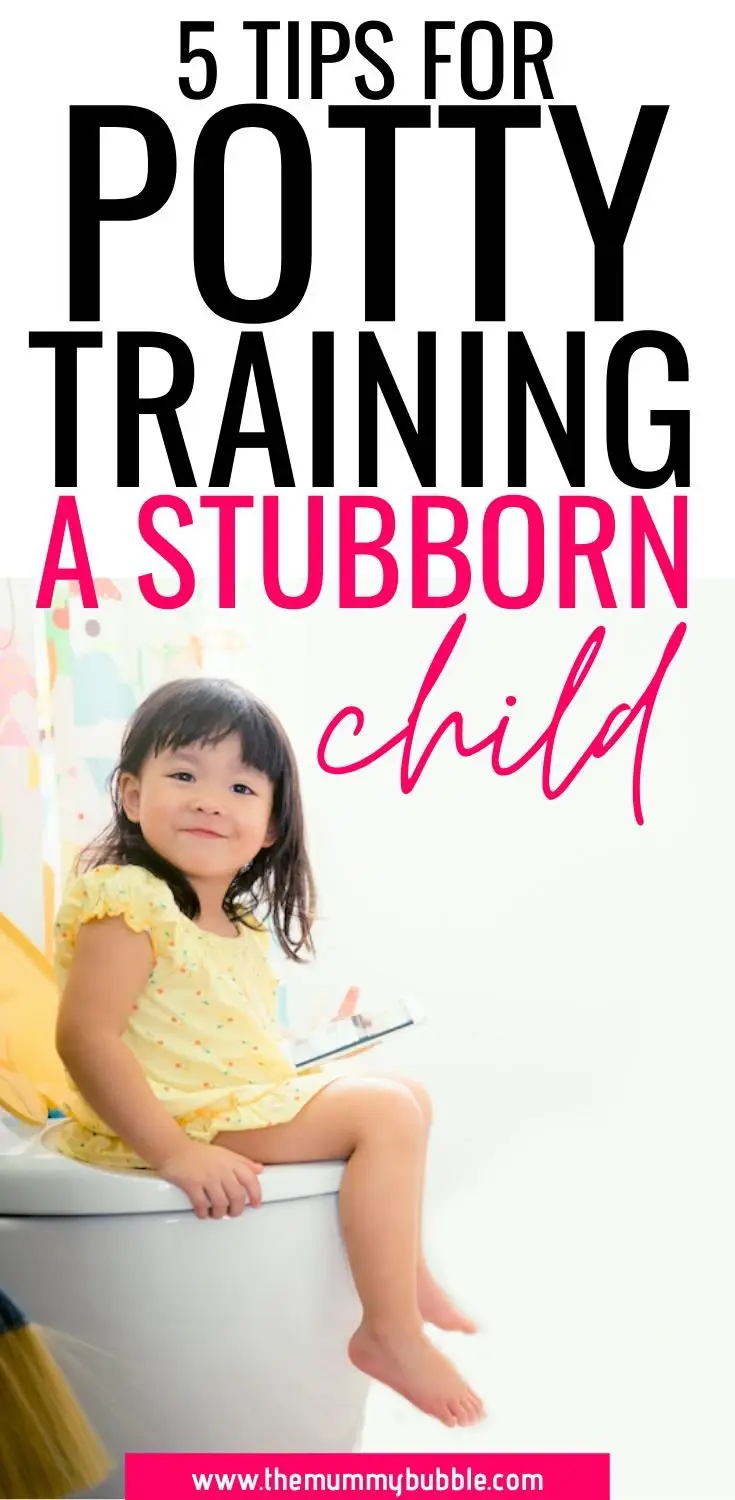
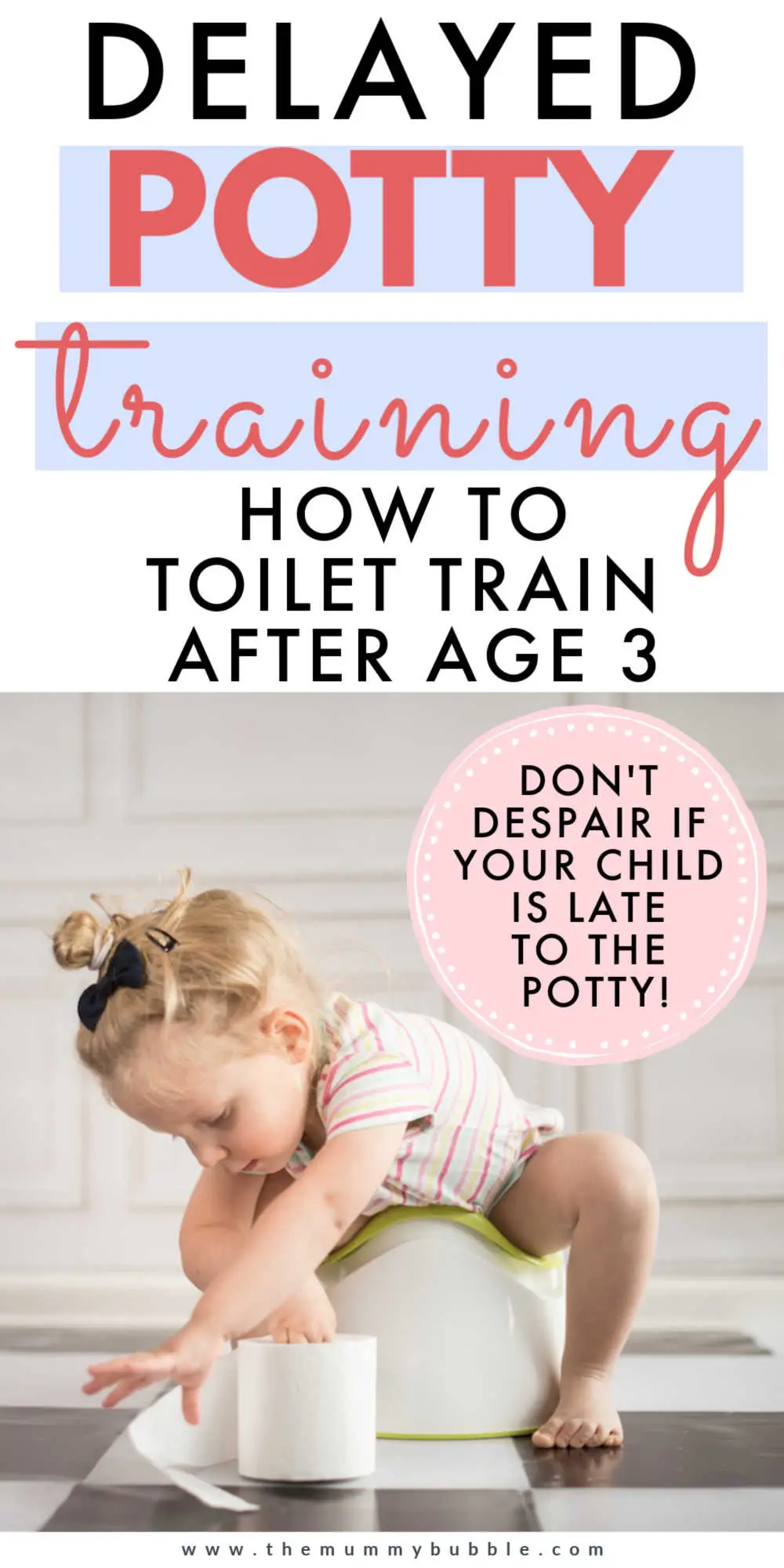
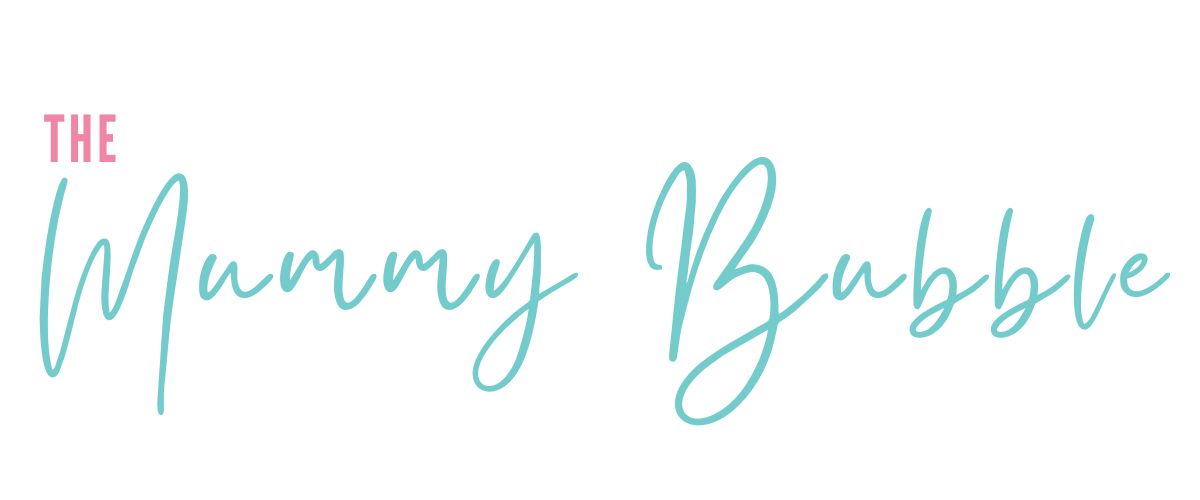
Rebecca
Wednesday 17th of April 2024
I'm really frustrated with potty training, my three year old. She just turned 3 a month ago. She's been pooping in the potty since she turned 2. But I've been potty training her to pee in the potty for the past 3 weeks. She's been peeing wherever she is if I or my husband don't prompt her to potty. She's has a small potty in her play area, but she'll ignore it and potty where she sits or stands. She only initiates pooping in the potty. How do I get her to learn to initiate peeing in the potty without having to prompt her all the time?